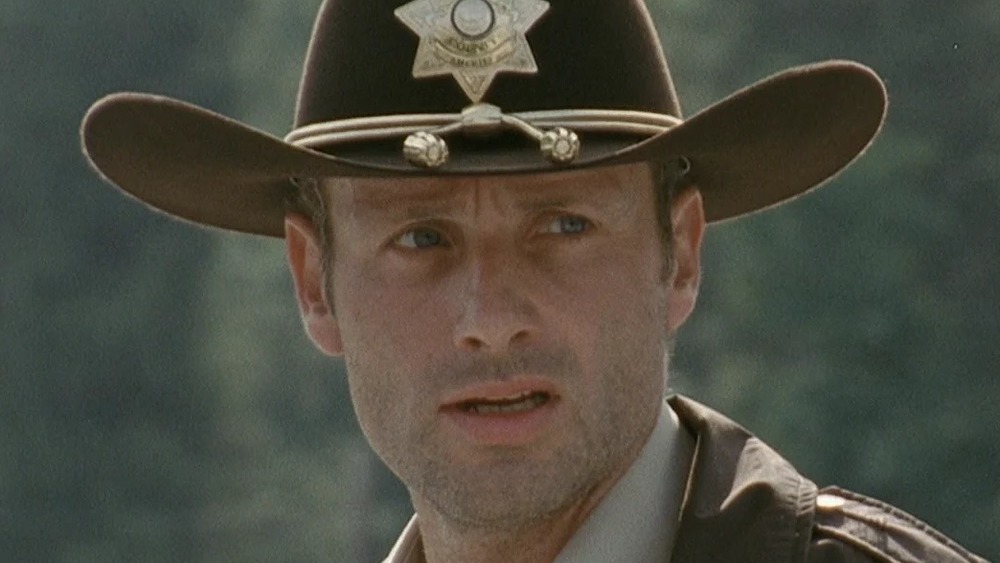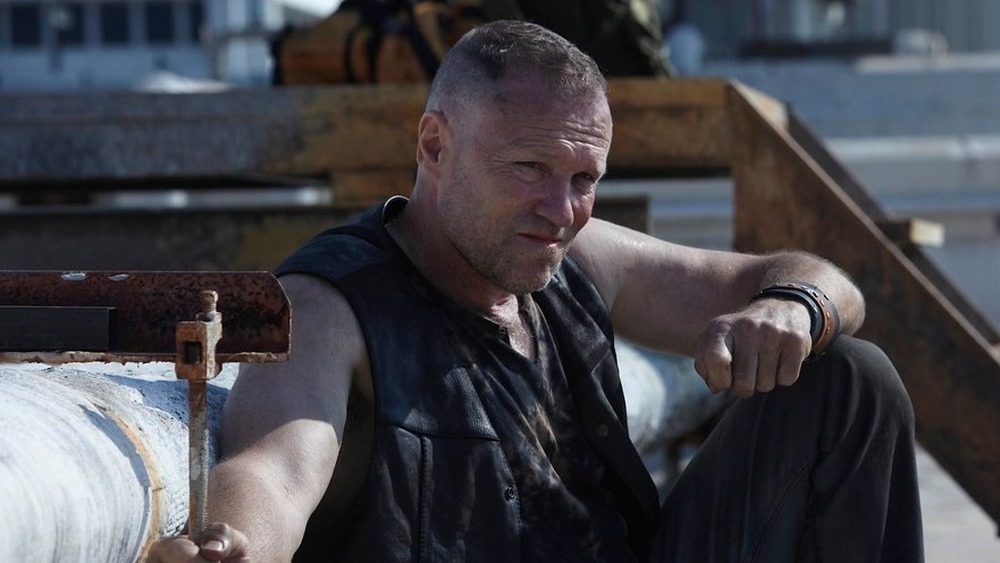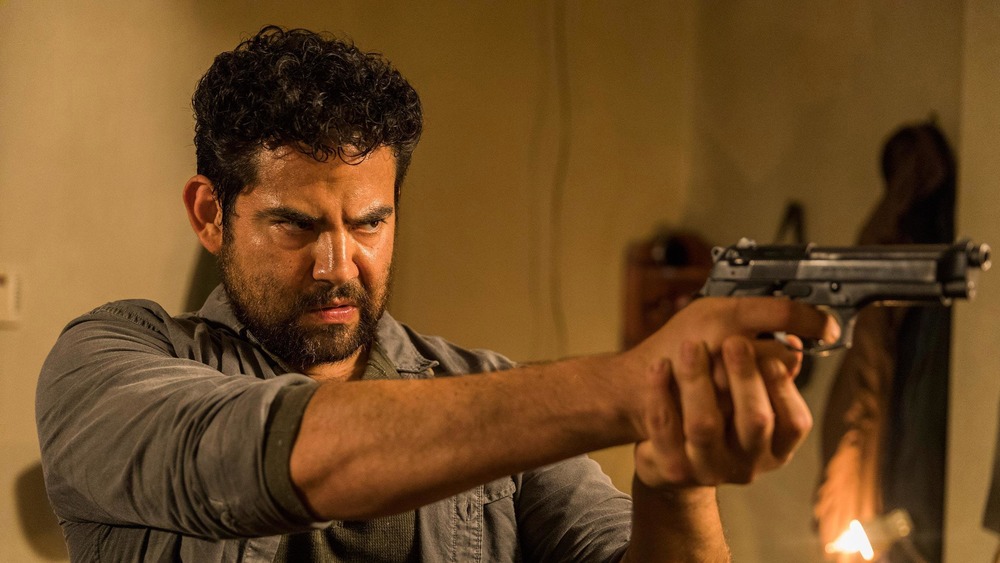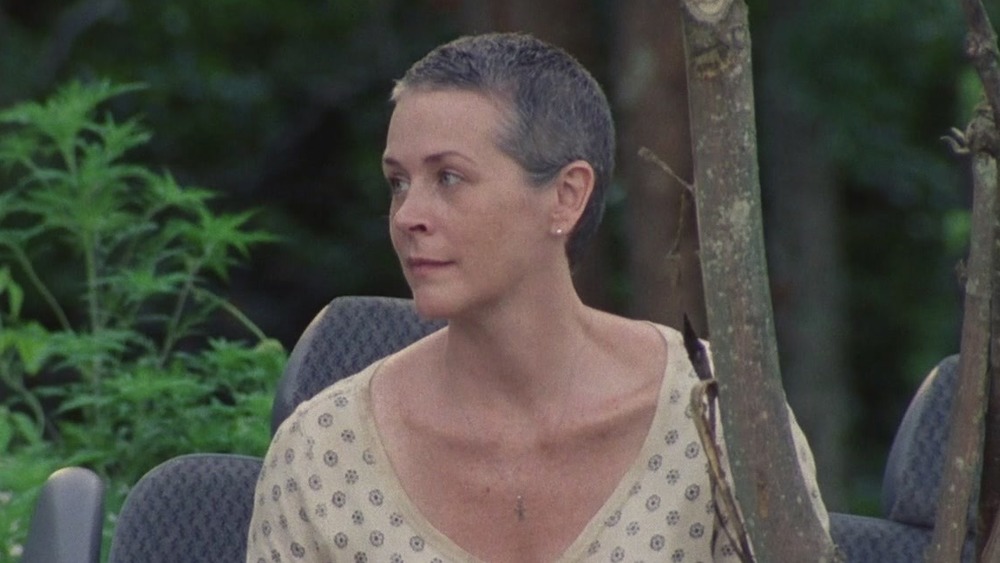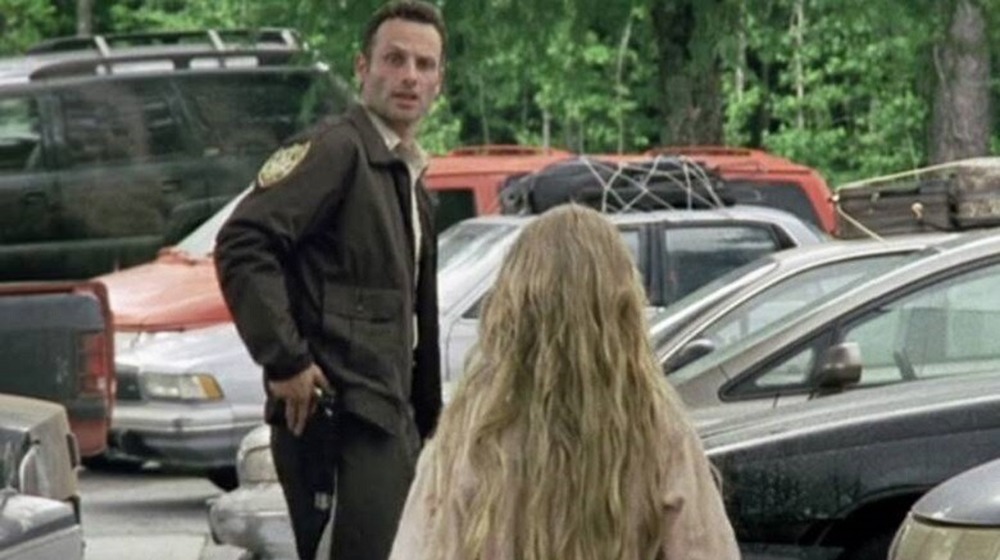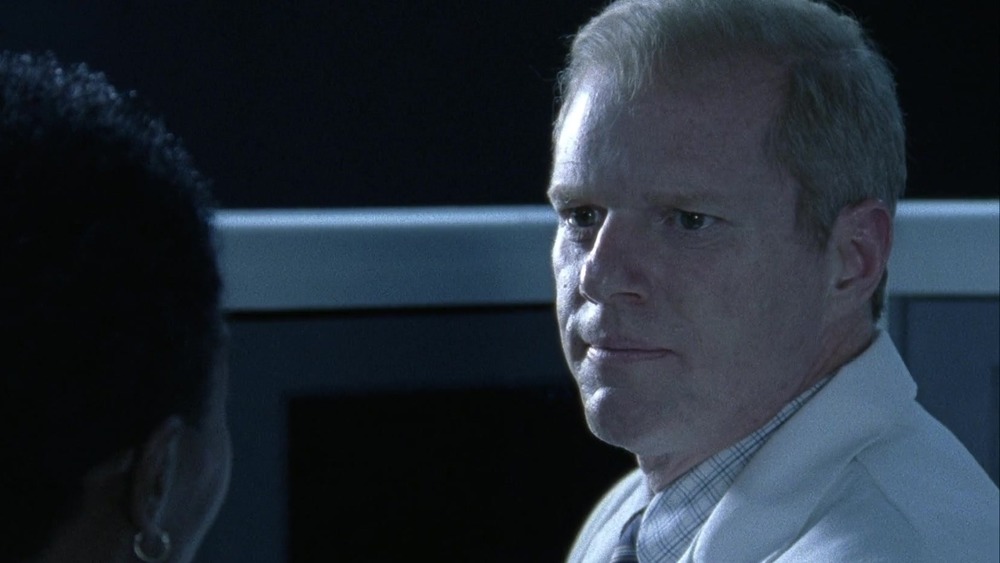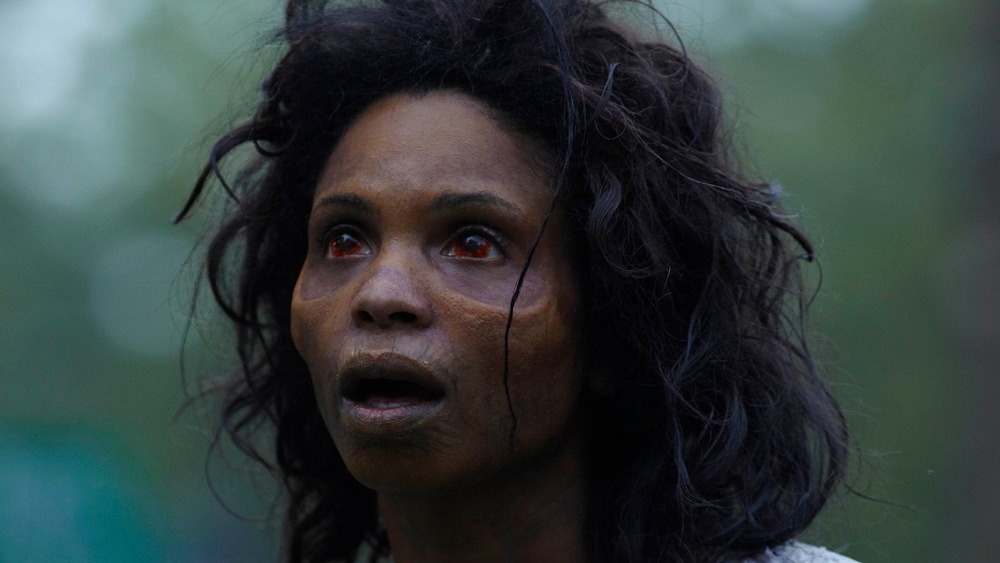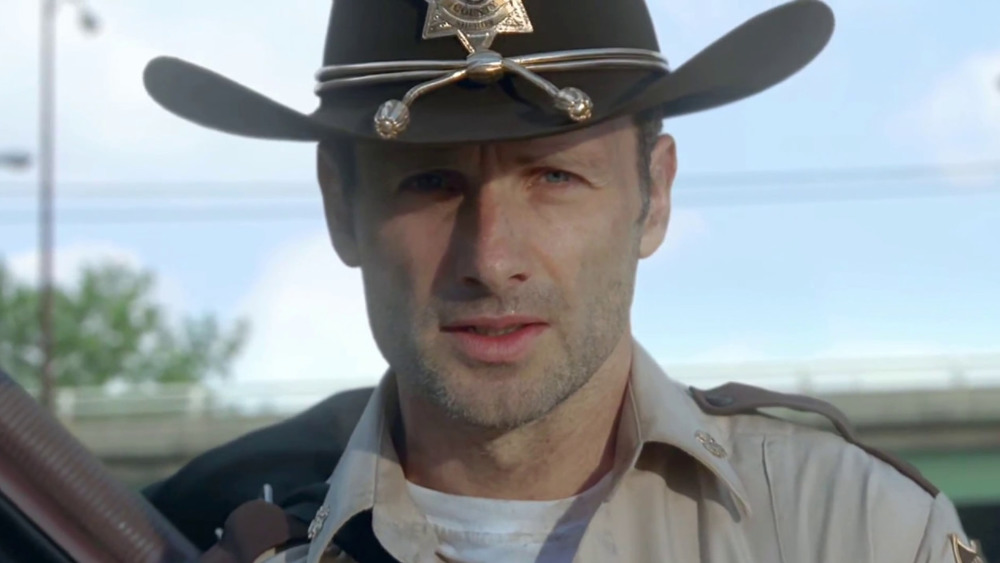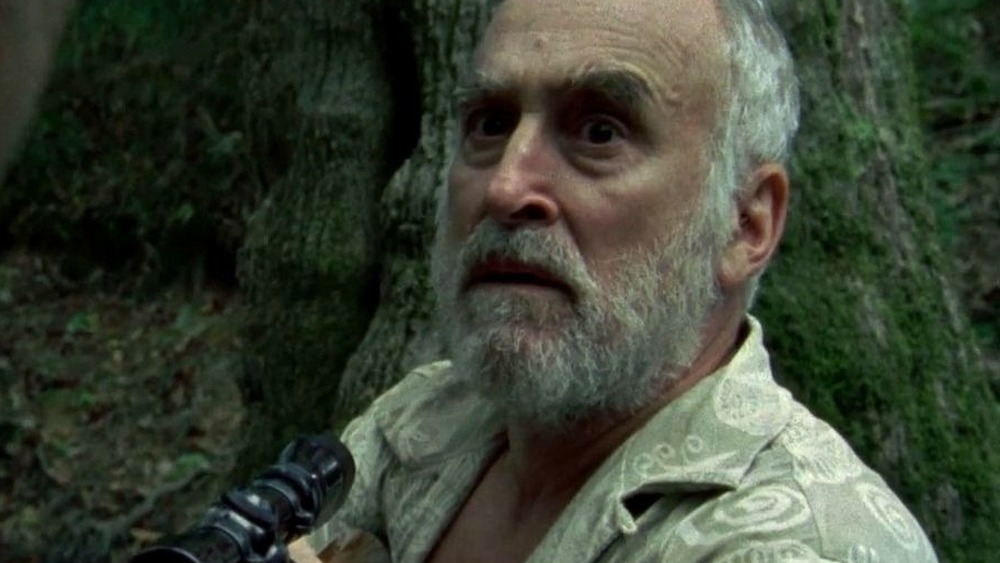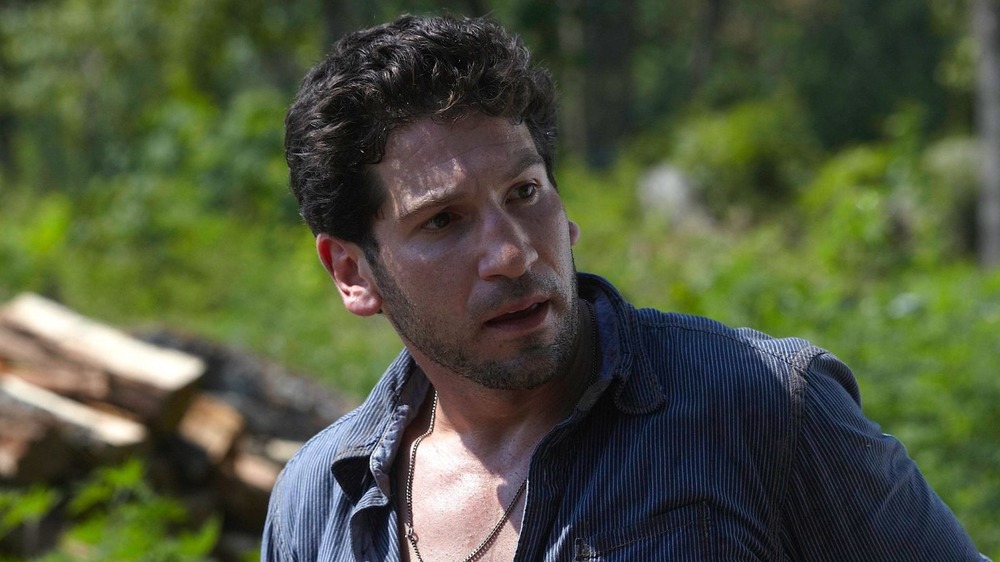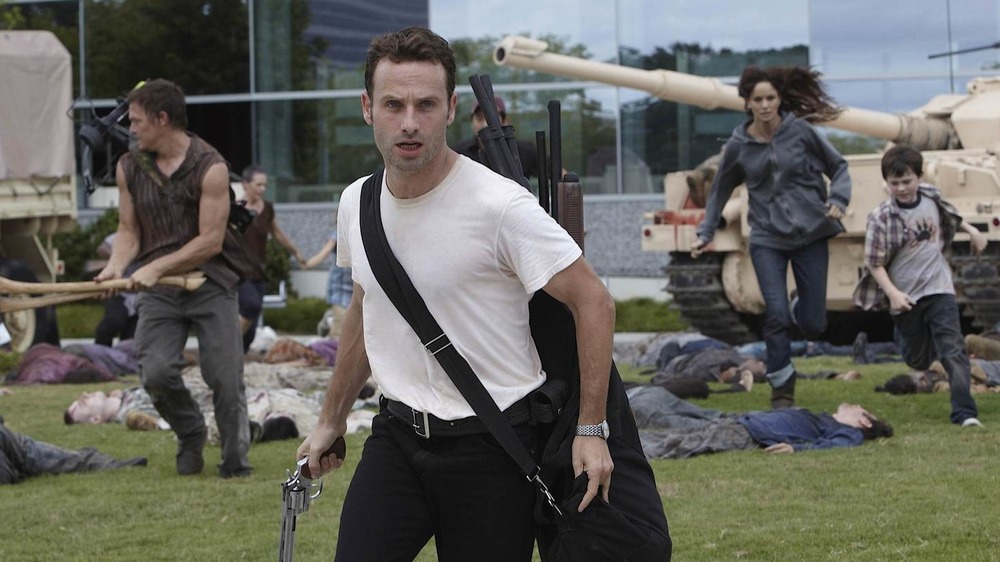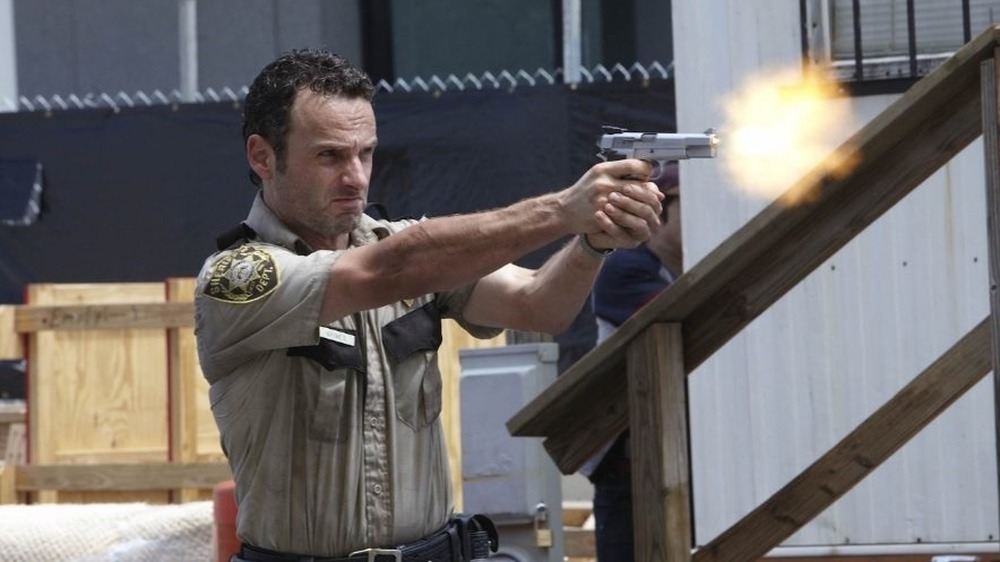Things You Forgot Happened In The Walking Dead Season 1
It's hard to believe it, but The Walking Dead aired its first episode over a decade ago. The pilot premiered on Halloween night back in 2010, and it seems doubtful that anyone at the time could've predicted how successful the show would become. It saturated pop culture starting about its fourth season, and The Walking Dead has remained a highly rated spectacle and one of the most popular scripted series on television.
The horror show has grown bigger and more bombastic with each new season, so it can be easy to forget what it was like all the way back in the beginning. It was still gruesome and still scary, but it often focused on smaller scale, character-driven conflict in its early run, making use of an excellent ensemble cast. A lot has gone down, both in the real world and the world of The Walking Dead, since that 2010 premiere, and if you don't remember what it was like in the early days of the post-apocalypse, then here are the things you forgot happened all the way back in The Walking Dead season 1.
(Warning — there are spoilers below.)
The Walking Dead season 1 saw the rise of a memorable villain
If you came late to the party on The Walking Dead, you may not have the full backstory on Daryl Dixon's brother, Merle. Outside of the walkers that Rick Grimes encounters when he awakens from his coma, Merle is the first real antagonist that the show had. He's a gruff, belligerent redneck with a heavy streak of racism thrown in, so it isn't too hard to figure out that he's pretty rotten. He's especially memorable because he's played by a pre-Guardians of the Galaxy Michael Rooker, lending the character effortless charisma despite his nasty views.
Merle's encounter with Grimes and the gang actually leads to Rick's first truly difficult test. After assessing what a threat Merle is, the lawman knocks him out and leaves him handcuffed to a pipe. In season three, when we encounter Merle again, he's sporting a killer knife prosthetic in place of the hand that he hacked off to escape. He's also joined forces with the Governor, and he's more than a little excited to see Rick and company again. He actually gets some redemption before it's all said and done, but it's fun to remember that Merle was the show's first real baddie.
Season 1 sees the creation of a forgettable bad guy
Remembering Merle wasn't that hard when he reappeared in season three. It hadn't been that much time, and Michael Rooker's character had left enough of an impact that seeing him again meant something. But in season eight, when we reencountered Morales amongst Negan and the Saviors ... it wasn't quite as big a deal.
In fact, even many loyal viewers of The Walking Dead were left scratching their heads when Morales reappeared and Rick recognized him. He and his family were part of the original group of survivors outside of Atlanta, but they parted ways with Rick and the rest of the crew when the lawman decided to head to the CDC. Morales was never mentioned or thought of again until season eight, when the Saviors made themselves known. At this point, Morales had lost his family to the horrors of the world, and his mind had vanished along with them. He then turned his back on Rick and the rest of the group, only to catch a crossbow bolt through the head from Daryl for his trouble.
Not every character on The Walking Dead plays a pivotal role, but Morales didn't make much of an impact in his initial run or his return.
We get the first hint of Carol's future
The Walking Dead did a pretty impressive job of making believable and interesting arcs for some of its biggest characters. One character who started the show out slow and then gradually transformed into a fan-favorite is Carol. She's one of the longest survivors of Rick's original crew, though in season 1, you may have overlooked her based off her character's humble beginnings.
In the original group of survivors, Carol seemed like someone who things happened to, rather than someone who took action. She suffered through an abusive husband, and the show's arcs were rarely centered around her. She eventually became a total badass, honing her skills until she became a ruthless and thoughtful leader, but we saw the first hints of her future persona all the way back in the first season.
When walkers invade the camp, Carol's husband, Ed, is killed. When the group is later stabbing the corpses to make sure they won't return, Carol stands by until Daryl reaches Ed. She takes Daryl's weapon and goes ballistic, unleashing years of pent-up fury on the corpse of the man who'd abused her for so long. That rage and ruthlessness has served Carol well over subsequent seasons.
'Walkers' is a misnomer
Walkers have changed quite a bit throughout the seasons that The Walking Dead has been on the air. As time has passed, they've generally decayed more and more, and even the show's logo has followed suit. However, one thing that never quite sat right with the show's take on zombies is right there in the title.
Originally, "walkers" could run.
You can actually see this in one of the first season's most memorable scenes, when Rick encounters the little girl outside the gas station. After calling out to her and realizing what she is, Rick tries to reason with her as she starts booking it towards him. Rick eventually has to shoot her to protect himself. Right before he does, however, the girl has started to run at him. The survivors probably wouldn't have lasted this long if all the walkers were actually runners.
Maybe it was a plot inconsistency, or maybe there's an explanation for it. Maybe it just made for a more effective scene. Regardless, you don't see the show's corpses picking up the pace like that anymore.
Rick learns the big secret about the virus
One rule in zombie media is practically universal -– getting bit means you turn. If a zombie bites someone, the virus/infection is going to spread and kill them, and they'll wake up not long afterward as another member of the undead horde. However, The Walking Dead took its time with a subtle difference in how the plague works in its world, and it made things even bleaker.
When Rick and his team reach the CDC, they meet Dr. Jenner. They're initially encouraged by meeting the virologist, but they soon learn that he's lost all hope and that the world is in even worse shape than they imagined. Before the lab's fail-safe kicks in and destroys everything, Jenner leans in and whispers something to Rick that shakes him to the core.
The audience doesn't learn until the second season, but Rick's attitude and decision-making is shaped by what Jenner tells him. We eventually learn the big secret — that everyone is infected with the disease already, and they come back as an undead monster regardless of what kills them. It changes the entire meaning of the show's title, in fact. The Walking Dead refers more to the group of survivors, rather than the shambling corpses they're up against.
In The Walking Dead season 1, walkers have memories
As The Walking Dead has gone on, some of the "evolution" of the walkers can be explained away, but this one is kind of tough. The first season makes a major point of showing the audience that walkers retain shreds of memory. We see it in Summer, the little girl Rick encounters, when she reaches down to pick up her teddy bear. We also see it in Morgan's deceased wife, Jenny.
Morgan and his son, Duane, are two survivors who help Rick understand what's happening. The three hole up in a house together, and a major aspect of the first episode is what Morgan should do with his zombified wife. Every night, she approaches the door of her former home and stares longingly at it, even turning the doorknob and trying to open it. Morgan knows he should put her out of her misery and has the opportunity, but he can't bring himself to do it.
It seemed like this retention of memory would be a major plot point, but it has rarely, if ever, come up since.
Rick was the 'nice guy'
When The Walking Dead first kicked off, we were quickly presented with two varying leadership styles. Rick Grimes, freshly awoken from his coma, was presented as the level-headed voice of reason, one of the last bastions of humane leadership in a world gone to hell. His former partner, Shane Walsh, was an emotional hothead who often acted without thinking and dealt with the repercussions later.
Both men were forceful leaders, and both men could make arguments that their leadership style was superior. Eventually, Rick's hopeful outlook won over the majority of survivors –- a far cry from where we find him in later seasons of the series.
It's an understandable evolution of the character. Even though Shane's anger was originally seen as detrimental, Rick has been betrayed too many times and seen far too many awful things to still hold out much hope for humanity. In later seasons, Rick would outright lie and murder people in cold blood if he saw them as a threat to himself or those he cared about. Season 1 was a simpler time for Officer Grimes.
You probably forgot Dale's speech that named later episodes
A fan-favorite character from the early seasons of The Walking Dead, Dale was the older man who often served as a peacekeeper and voice of reason whenever Rick started to butt heads with others. (Well ... usually Shane.) Dale helped a lot of people in the survivors' camp cope with losses and hardship, and one of his most memorable speeches came in the season's fourth episode.
While sitting around the campfire and actually enjoying a peaceful moment, the subject turns to Dale's watch and why he's concerned with what time it is. He launches into an inspirational anecdote about the importance of keeping track of time and the importance of finding peace and happiness where you can. It's a poignant moment in a show about surviving at all costs, and it helps to keep everyone grounded.
Dale's speech makes a subtle return in season five. The last episodes of that season are entitled "Remember," "Forget," "Spend," "Try," and "Conquer," which are also five of the key words in Dale's speech. Considering the ultimate themes of season five, it's a fitting place to draw inspiration from.
The Walking Dead season 1 was only six episodes
The Walking Dead sparked a lot of interest pretty quickly after its debut, but it's tough to imagine that the actors and showrunners saw it becoming the pop culture phenomenon it eventually did. In fact, the whole idea of a longform, dramatic horror series no doubt sounded like a longshot success when the show was first in the works. That's probably why the first season was only six episodes.
That's right, only six. That's shorter than most miniseries! After the show's remarkable success, production was quickly ramped up to make for longer seasons (and more time to air ads). Season 2 more than doubled the episode count to 13, and then the show seemed to settle into 16-episode seasons for the majority of its run. Season 10 of The Walking Dead is even longer, boasting 22 episodes in total over a split season. So, just remember The Walking Dead's first season the next time you complain about a binge-watch of something being too short!
Shane was more than just a jerk
The Walking Dead usually does a decent job of giving viable reasons for its characters to behave the way they do. Even the baddest of Walking Dead bad guys generally have an explanation for acting as awful as they are, even if it's a flimsy explanation. As such, it was odd that the series went the way it did with Shane.
Shane was the closest thing to a "big bad" season 1 had. Even though he operated with the survivors, the audience (and many of the characters) could see that it was only a matter of time before he snapped. It's also important to remember that Shane proved himself to be more than just a jerk.
In "TS-19," the season 1 finale, the group finally arrives at the CDC and gets a brief window of happiness. They arrive at the finish line, they find hot showers and booze waiting for them, and they let their guards down and celebrate. After imbibing a bit, Shane corners Lori (his best friend's wife) and confesses how he feels. When she rejects him, Shane tries to force himself on her.
He feels terrible about it, but it still doesn't excuse the behavior. And this scene makes it a little easier to swallow when Shane is killed in season 2.
The entire world has gone dark
Nearly every story involving the zombie apocalypse involves our characters searching for the mythical "safe" area. Often, it's what drives their actions and keeps them moving throughout the story. In the first season of The Walking Dead, the group's goal in reaching the CDC is to find where they might be able to ride out the outbreak or at least learn if there's any hope at all.
There isn't. After their night of revelry upon reaching the CDC, Rick and the rest of the survivors learn the horrible truth from Dr. Jenner – there's nothing out there. The CDC lost contact with every other research station that was working on trying to combat the virus. Most of the characters take this to mean that a cure or means of preventing the virus isn't out there.
Obviously, there are other survivors in the world, as dozens more episodes have shown. But as Rick and everyone else realizes at the end of season 1, it's only a matter of time before everyone succumbs and becomes just another shambling corpse.
The Walking Dead season 1 has that weird achievement noise ... maybe
One of the popular early fan theories surrounding The Walking Dead is kind of fun. It goes something like this — Rick never actually wakes up from his coma. The zombie apocalypse isn't actually happening. Instead, Rick is still lying in his hospital bed, and his subconscious is incorporating events from the real world with the fact that Rick is basically dead. The theory has been debunked by the show's creators multiple times, but we all know how the internet works.
As with a lot of theories that gain a little traction, fans were eager to comb through every line, every odd edit, and every background happening to try to fit in more and make the theory work. This led to an incredibly strange (and probably nonsense) claim that you could hear an Xbox achievement noise when Rick kills a walker in the Walking Dead pilot episode. Now, is it probably just the sound of a zombie grabbing a chain link fence as it dies (coupled with the power of suggestion working overtime)? Absolutely. Either way, it's good to know that Rick's gamerscore went up so soon after he came out of his coma.
